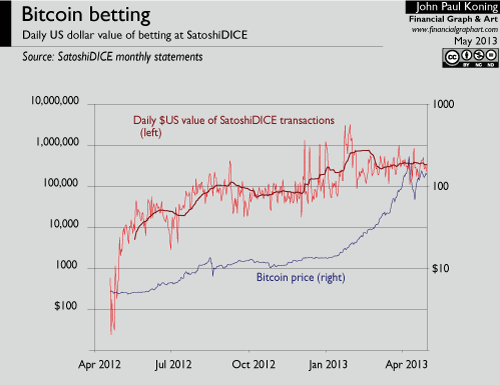The Telegraph's Willard Foxton writes that Silk Road, a venue where people exchange drugs for bitcoin, is in a recession of sorts. He blames this on higher bitcoin prices:
Following the recent surges in the value of Bitcoin, people have been selling less and less, initially because the value of the Bitcoins was going up so fast people were unwilling to part with them; then, once the Bitcoin price started crashing, dealers were unwilling to part with valuable drugs for Bitcoins worth who-knows-what.I find Foxton's claim unlikely. Yes, in a regular economy, soaring demand for dollars may cause recessions because certain prices are sticky. But the bitcoin universe isn't a sticky price universe. Silk Road sellers will quickly reprice their product in order to convince buyers to part with their bitcoin. Buyers will modify their bids in order to convince sellers to part with their drugs. As bitcoin prices rise or fall, the real value of transactions in the Bitcoin universe should be constant.
What are my assumptions? I think that people who participate in the bitcoin universe are incredibly savvy about exchange rates and real values. They have to be. Fluctuations in BTC prices are so extreme that anyone suffering from money illusion, or a failure to adequately adjust prices, will quickly die off. In the dollar/euro universe, on the other hand, money illusion is common. Being fooled by nominal prices changes isn't life-threatening, so sufferers aren't weeded out. They never learn because they don't have to.
That's the theory, but what do the numbers say? Foxton provides no evidence for his hoarding claim. Silk Road sales data would suffice. Neither do Izabella Kaminska and Joe Weisenthal who quote Foxton as an authority on the perverse hyperdeflationary effects. [I could digress on the echo chamber effect here, but I'll resist].
Here's my attempt to pin down a few datapoints showing the real value of transactions in the bitcoin universe. SatoshiDice, a bitcoin gambling website, is one of the bitcoin universe's largest companies. Unlike Silk Road, it is public. So we can get good information on its operations. Around 50-60% of all bitcoin transactions involve SatoshiDICE, so it surely serves as an appropriate bellwether for spending activity in the bitcoin universe.
The chart below shows the daily real, or US dollar, value of all SatoshiDICE bets over time.
A number of "whales" (large bettors) placed bets in December and January (see discussion here and here) which may explain the large spikes in bet value around that time. We should ignore these spikes. Looking at the base level of transactions, we can see a gradual increase in real betting value over time, despite the rising bitcoin price. No evidence of a recession here.
Another way to verify the claims of a bitcoin recession would be to look at the value of bitcoin-denominated stock prices over time, specifically the stocks of those companies whose revenues are in bitcoin, not fiat. A decline in stock prices as bitcoin rises would validate the recession hypothesis. What do the numbers tell us? Shares of Vircurex, a cryptocurrency exchange, are up since its February IPO. SatoshiDice is unchanged since January 1. Havelock, a bitcoin miner, has traded between $1.20-2.00 for months. Lastly, MPOE, a bitcoin stock and options exchange, keeps tearing it up.
If people were hoarding such that bitcoin velocity was declining, the prices of all these stocks should have fallen dramatically. That they haven't would seem to indicate that changes in bitcoin price are largely neutral. Those claiming that bitcoin's skyrocketing price is decreasing bitcoin velocity and causing aggregate demand shortfalls, or recessions, need to show more evidence for their claims.

Comments
Post a Comment